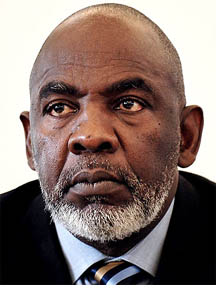BAMAKO (Reuters) – Mali’s prime minister was forced to resign yesterday by the soldiers who staged a coup in March, underscoring the military’s continuing grip and complicating international efforts to help push Islamists from the north.
Once a beacon of democracy in West Africa, Mali has been mired in crisis since the coup, when ethnic Tuareg rebels and al Qaeda-linked Islamist fighters took advantage of the chaos to seize the northern two-thirds of the arid nation.
Although the soldiers gave way to a civilian president and prime minister in April under international pressure, they have never been far from power and have shown their readiness to stamp their authority on divided and weak politicians.
Cheick Modibo Diarra resigned as prime minister hours after he was arrested trying to leave the country for former colonial power France and was brought to the ex-junta’s headquarters at a barracks in Kati, just outside Bamako.

“I, Cheick Modibo Diarra, hereby resign with my entire government,” a nervous-looking Diarra said in a short statement broadcast on state television early yesterday. Diarra is a former NASA scientist and Microsoft chief for Africa.
The officer who led the coup, Captain Amadou Sanogo, appeared on state television late yesterday to say his supporters had not used violence.
“We only facilitated it [the resignation],” he said.
“Some weeks ago he [Diarra] said if anyone wanted him to go, he would tender his resignation, not to the president, but to us. So yesterday, we saw that it was necessary for him to go,” Sanogo added.
Minutes later, a news presenter read a decree from interim president Diouncounda Traore appointing Django Cissoko, a former senior official in the president’s office, as the new prime minister.
Fearing Mali has become a safe haven for terrorism and organised crime, West African leaders have signed off on a plan to send 3,300 soldiers to Mali to revamp its army and then support operations to retake the north.
But Diarra’s arrest and the fresh political turmoil it has created in Bamako could discourage international partners from backing the plan until civilian rule is strengthened.
“What is really clear now is that the military junta is the one that is in control,” said Gilles Yabi, head of the International Crisis Group’s West Africa programme.
“They have the weapons, they have the force and they are taking control of the transition … the immediate obstacle in the crisis in Mali is now in Bamako and not the north,” he said.
Sanogo has been repeatedly accused by his critics of political meddling since he stepped down and was given the task of overseeing reforms of Mali’s army.
A soldier in Kati said he witnessed a tearful Diarra being scolded by Sanogo for having brought shame to the country.





